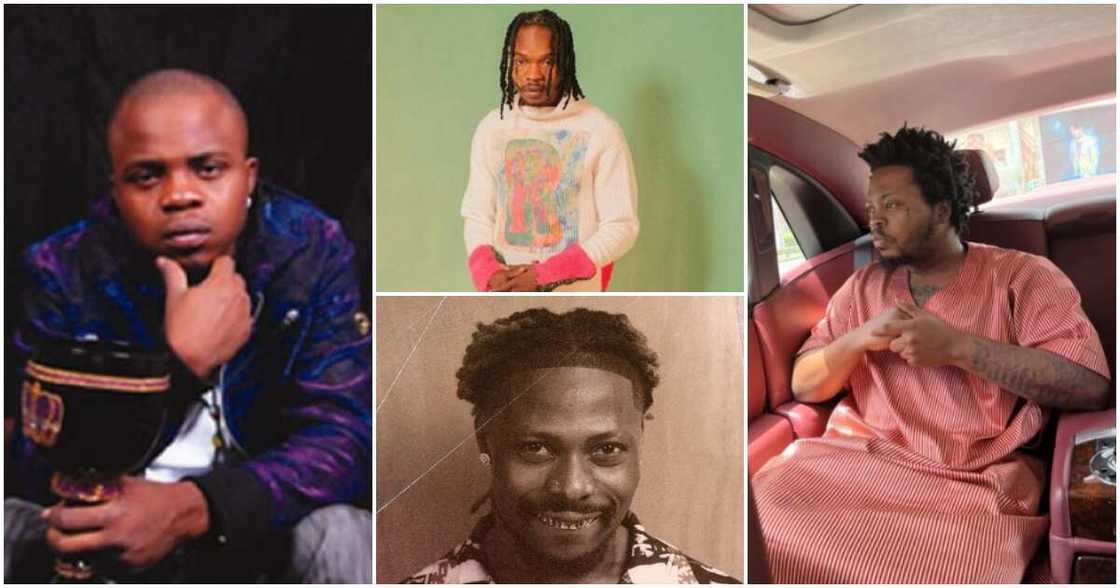Evolution of Street Music: Who Is the King? Dagrin Olamide, Naira Marley, Asake or Portable
- Many still claim that the king of Nigeria's street music is DaGrin, while some believe Naira Marley currently holds that mantle, but we dare to ask who is the king of street music
- The rise of Nigerian street music is often adjudged to have kicked off in the early 2000s, but empirical evidence shows that isn't accurate
- This article consists of a comprehensive breakdown and evolution of street music in Nigeria, from the rise of Fuji music to street hip-hop to Afro-pop
Nigeria's street hip-hop scene has witnessed an unprecedented rise over the last two decades, with considerable influence from the American hip-hop culture, Yoruba lingua, and traditional Afrobeat tempo.
Fuji used to be the mainstay of what is referred to today as street music. However, the influence of Fuji has made its way into the mainstream Nigerian music echelon, even though it is easily overlooked as just young singers expressing their art through supposed street lingua.

Source: Instagram
When you meet an older adult who wasn't mainly a fan of Fuji music from the 1980s or 90s but has somehow fallen in love with songs from Naira Marley or Portable, ask what they enjoy about these singers' music.
They might say it's the street vibe, fast-paced beats, or street slang, but in truth, the style of music has been around for a while and didn't just start with the likes of Naira Marley or Asake. However, they transformed the sound and are much more audacious.
PAY ATTENTION: Join Legit.ng Telegram channel! Never miss important updates!
To the popular question, who started the evolution and is the king of Nigeria's street music?
To answer the question, the rise of street pop would be broken down into three generations: the pre-mainstream era, the break-out era and the mainstream era of recognition and domination.

Read also
"When he ran mad, we cared for him": Elderly women threaten to pull clothes over Portable's trouble
Also, we would touch on its proponents, its significant influencers and flagbearers.
Pre-mainstream era
The early days of street music can be classified as the glory days of Fuji music when people like Obesere, Pasuma, and Saheed Osupa were at the height of their careers. This was mainly during the late 1990s and early 2000s.
Reggae, dancehall, and hip-hop artists dominated pre-mainstream Nigerian music. At the time, the influence of street music had started to sieve into the mainstream, with the likes of Konga and Dekunle Fuji all recording tremendous feats with their street pop sounds but never actually consolidating their positions.
In the same era, there were also the likes of African China, Daddy Showkey, Baba Fryo and Marvelous Benji; to some, they were street music crooners. Yet, their sound was closer to Reggae/dancehall than Afropop.
Nevertheless, a new generation of bolder street singers like 9ice, Terry G, Klever J, K-Solo, and Danny S came through, pushing the envelope and laying the foundation for the mainstream generation, even though some might argue that 9ice achieved mainstream recognition but not acceptance.
Street music break-Out era
9ice led the charge for this generation for a while until one particular ghetto rapper got everyone hooked on his sound, lyrics and punchlines, Oladapo Olaitan Olaonipekun, better known as DaGrin.
His flow, flawless street vibe, and slang usage changed the game, creating heavy hip-hop bars. DaGrin is hailed by many as the king of street rap. He used his songs to tell ghetto stories and the truth of the average Nigerian youth who came from nothing and didn't have a privileged background.
But, DaGrin's rise was cut short by an act of God - death. He died in a car accident on April 22, 2010. Nonetheless, his legacy lives on, and some recognise him as the king of Nigeria's street music.
Shortly afterwards, the man who identified himself as the "voice of the street" came into the music scene. Olamide broke the barrier and took street music mainstream as a sound, culture and rap.

Read also
"When life shows me pepper, I make Peppersoup": Etinosa speaks on navigating Nollywood, motherhood and more
The mainstream era of recognition and domination
"Changing the narrative for the ghetto youth" was also one of the famous words of Nigerian singer, rapper and record label boss Olamide Adedeji aka Olamide Baddo.
He famously noted that part of his mission as a musician was to help inspire a new generation of street musicians and help change how they're seen.
Olamide: The Quintessential Street Pop Act
In 2011 when Afropop was making its early intercontinental steps, and the young Wizkid and Davido were preparing to launch into stardom on its shoulder, Olamide, however, towed on a different path.
Taking a cue from Dagrin and his infusion of the Yoruba language in foreign hip-hop, he released Eni Duro in 2011.
Baddosneh, as he is sometimes called, went on to soften the core of street music and was later called out for distancing himself from the trenches, which many saw as the platform that gave him the incursion into mainstream music.

Read also
2023 elections: "Celebs that fueled tribalism deserve bullying," Rapper Falz says, makes case for others
This might seem close to the truth, but Olamide has never forgotten his street value and its part in his success.
Olamide, since his big break, has released seven studio albums, including EPs with immense street value and one Afrobeat album.
He has also brought several street musicians into the limelight, starting with Lil Kesh, Naira Marley, Bella Shmurda, Asake and Portable.
Based on precedent, it is almost impossible to query who the king of street music is; Olamide Adedeji, aka Baba Maximiliano, rules above all, and his mentor ID Cabasa would be super proud of what his mentee has gone on to achieve.
Evolution of Neo-street music and slow Afropop (New Generation)
Since the start of the 2000s, many young new street artists have emerged and leveraged the platform Olamide and Naira Marley provided, including their dance routines.
The latest stars are younger, more enterprising, and much more willing to stretch their artistry to accommodate other sounds so that the current version of street pop is more sonically layered than ever.
Those leading the charge are Asake, Bella Shmurda, Zinoleesky, Mohbad, Portable, and Small Doctor.
Source: Legit.ng




